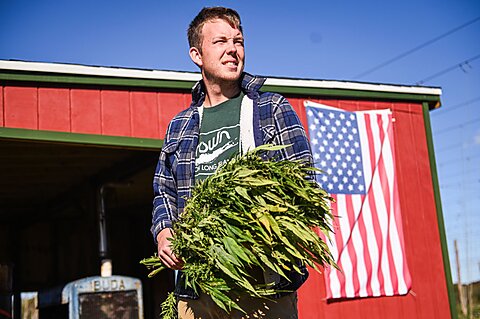The US House of Representatives voted to approve the continuing resolution and appropriations bills that the US Senate approved on November 10. In doing so, it reaffirmed the Senate’s recriminalization of hemp-derived cannabinoids such as gummies and drinks and effectively shut down the US hemp industry. This occurred despite the best efforts of Senators Rand Paul (R‑KY) and Jeff Merkley (D‑OR) and Representative James Comer (R‑KY), along with a bipartisan group of 27 representatives, to prevent it in their respective chambers.
Reasonable people might wonder why Congress chose to eliminate the hemp-growing industry that supplies millions of customers with products they enjoy and use for self-medicating for pain, depression, anxiety, and even PTSD.
It’s unlikely that they think THC gummies or drinks are more dangerous than alcohol. Peer-reviewed studies consistently show that alcohol causes much more harm—such as health problems, dependence, and social issues—than cannabis. Two landmark Lancet analyses by Nutt and colleagues, along with later work by Lachenmeier and Rehm, all rank alcohol as the most harmful, with cannabis much lower. However, these studies generally look at cannabis broadly—mainly smoked—and don’t specify whether a 5 mg THC seltzer is safer than a 5 percent beer. They show that, overall, cannabis is less harmful than alcohol; they don’t yet provide specific evidence about today’s THC beverages.
A recent systematic review—the first serious look at cannabis-infused beverages—underscores how little we actually know. Froude et al. (2024) found just 29 relevant studies, most focused on marketing and product composition, with only a handful examining acute effects in humans. Those studies reported some unpleasant reactions in infrequent users and highlighted a persistent problem with inaccurate labeling. But the authors’ central point is the most important: research on cannabis drinks is sparse and inconsistent and offers virtually no insight into long-term risks or how these beverages compare to alcohol.
New cardiovascular research suggests that regular use of THC edibles may impair vascular function to a degree similar to tobacco smokers—hardly a trivial finding, and one that should curb any “edibles are harmless” claims. But the study is cross-sectional and offers no direct comparison to alcohol, so it tells us far less than some advocates or critics might hope.
Policymakers may have valid concerns about children consuming these products, which could poison them. But, like alcohol and tobacco, no reasonable person is suggesting these products should be marketed or accessible to minors. And lawmakers should not restrict adults’ right to buy these products based on concerns about minors using them. Otherwise, they might as well consider reinstating alcohol prohibition or banning any vehicle that isn’t self-driving.
Edible THC products can pose problems. Kids may accidentally get into them, adults sometimes consume more than they intended, and long-term heavy users might face cardiovascular risks. However, no evidence singles out low-dose THC drinks as a unique danger. The necessary studies simply aren’t available yet. Importantly, these are not unusual risks—we see similar patterns with legal products like alcohol, Tylenol, and energy drinks. We manage these risks through education and reasonable safeguards, not by banning products for adults. Low-dose THC beverages should be treated similarly: as an adult-use intoxicant that requires clear labeling and responsible access rules, not prohibition.
Several lawmakers who claim to support federal marijuana decriminalization—or even full legalization—voted this week for a bill that effectively re-criminalizes many hemp-derived cannabinoids. In the Senate, Dick Durbin (D‑IL) and Tammy Duckworth (D‑WI) supported the motion that maintained the hemp ban language. In the House, Republicans Brian Mast (FL-18), Tom McClintock (CA), and Nancy Mace (SC), along with Democrats Jared Golden (ME), Tom Suozzi (NY), and Don Davis (NC), all longtime supporters of cannabis reform, also voted “yes.” The result reveals a striking example of cognitive dissonance: Congress wants to step back from policing marijuana while simultaneously extending federal control over non-marijuana products from the same plant.
Maybe it’s because national cannabis trade groups like the US Cannabis Council and the American Trade Association for Cannabis and Hemp, which represent the legal cannabis dispensary industry, have been urging Congress to classify hemp-derived THC products as illegal marijuana—effectively lobbying to close the so-called “hemp loophole.” They’re not alone: major alcohol producers, including the Distilled Spirits Council, the Beer Institute, and the Wine Institute, have called on lawmakers to remove intoxicating hemp beverages from the market.
Yet even the alcohol industry isn’t united. A large coalition of beer, wine, and spirits distributors has told Congress not to close the “hemp loophole” at all, arguing instead for a regulatory and tax framework that treats hemp drinks like alcohol. The politics of cannabinoids, it seems, split industries just as much as Congress.
The hemp industry has 365 days to comply with the new prohibition. That gives lawmakers time to reconsider and decide whether they want a drug policy based on evidence and adult autonomy or one driven by protectionism and fear. Congress should use that year to choose the former. A free society doesn’t ban products because it lacks data; it gathers data, tells the truth, and lets responsible adults make their own choices.

